Whether it’s one of the best ellipticals that money can buy or one of the best ellipticals you can buy, cross trainers (aka ellipticals) deliver a full-body workout that can reduce stress on muscles and joints when compared to running. (1) If you’re looking to bring one of these machines into your home gym, you may be wondering, “How much do ellipticals cost?” Luckily, ellipticals come in budget, mid-range, and high-end price ranges, with costs as low as $100 or as high as (gulp) $4,000, depending on its features, construction, and workout capabilities.
The team here at BarBend knows a thing or two about ellipticals. We love ellipticals — almost as much as my mother who replaced my bed with an elliptical when I left for college — and we’ve tried and tested nearly 30 different elliptical trainers, from budget buys to gear on par with the fancy fitness equipment seen in commercial gyms. Now, we’re passing on what we’ve learned about the cost of these machines to you.
Price Ranges for Ellipticals
There are three tiers of ellipticals — budget, mid-range, and high-end — with price tags that match their features, build, and capabilities. Before you smash your piggy bank or bring the hammer down on that cousin who owes you money, we’ll review some of the basics of how much you can expect to spend based on each tier.
Budget Ellipticals — Under $1,000
Of budget gym equipment, BarBend expert reviewer Amanda Capritto says, “Budget-friendly [equipment] specifically provides access to exercise for… individuals with a lower income who know they are ready to commit to exercise and… individuals at any income level to test the waters in this exercise category without spending thousands of dollars on a machine they may end up not using.”
Whether you’re looking for something you can afford or simply want to dip your toes into the elliptical waters, our list of the best budget ellipticals is a great place to start your search.
Budget, or entry-level, ellipticals tend to fall under $1,000, with some options starting as low as $100. While there are always exceptions, this cardio equipment is often very basic, with manual resistance adjustments, limited warranties, and lower weight capacities of around 220 to 265 pounds (the industry standard is 300 pounds).
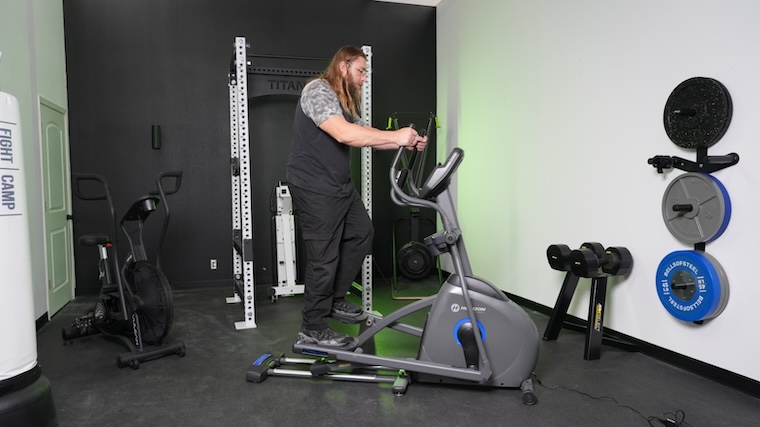
You won’t likely find a built-in touchscreen here — or any integrated programming — but some models will feature a console display with a few basic programs and training metrics. It’s worth noting that because these tend to be simple machines, they’re often best suited for low-intensity work or as a means to stay active.
Some brands we like that make solid budget ellipticals are Horizon Fitness, Sunny Health & Fitness, ProForm, and Schwinn.
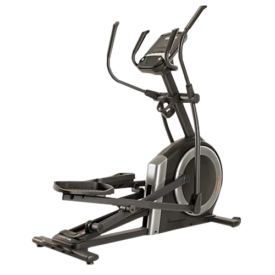
Once you purchase this elliptical, you’ll have everything you need for an awesome workout. You just need to bring two things — yourself and your tablet or smartphone. The ProForm Carbon EL keeps the price down by not having a large screen but still includes premium features like power adjusting resistance, incline, and stride length.
The $799 ProForm Carbon EL, for example, is a worthwhile consideration for an entry-level elliptical machine. It has 18 levels of Silent Magnetic Resistance and iFIT connectivity, so you sync your mobile device and use it to track your stats and explore the app’s trainer-led classes. Access to iFIT, one of the best fitness apps we’ve tested, will cost between $15 and $39 a month depending on your subscription. That said, you don’t have to invest in the app to use this elliptical.
Mid-Range Ellipticals — $1,000 – $1,500
If you’ve budgeted between $1,000 and $1,500, you can expect to find a mid-range elliptical with added features that can help support your fitness goals while keeping you comfortable. These ellipticals provide a ton of value, and there are many options that provide users with a taste of what high-end machines offer.
Some of these ellipticals have LCD screens that allow you to stream workouts from subscription services like iFIT and JRNY, though these services often come with monthly membership fees.
Others will feature basic consoles providing training metrics, heart rate readings, and some built-in workout programs, like timed or distance-based trials, HIIT workouts, and target heart rate routines.

Ellipticals in this price range typically have larger user weight capacities — between 275 and 350 pounds — and heavier flywheels that can support a smoother and more sturdy cardio workout experience. You may even find some options with incline capabilities to help strengthen your quadriceps and increase your VO2 max. (2)(3)
You can find mid-range ellipticals offered by brands like ProForm, NordicTrack, Sole, and Schwinn.
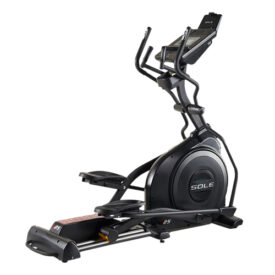
The E25 elliptical features an impressive 350-pound user weight capacity along with a range of built-in workout programs for more streamlined training. Plus, Sole covers this home gym machine with a lifetime warranty for the frame and flywheel, so there's little worry about future mishaps or wear and tear.
The Sole E25 is an excellent mid-range elliptical, clocking in at just $1,199.99. It offers 20 levels of resistance and up to a 20-percent incline for users up to 350 pounds. It’s also one of the best compact ellipticals we’ve tested, taking up 11.67 square feet — roughly the size of a full-size baby crib. (4) “It just seems like they set it up for comfort — angled and textured pedals, handlebar grips, even the fan. Some of these ‘little’ things made a huge difference,” said BarBend editorial member Kate Meier, NASM-CPT, USAW-L1, CF-L1.
High-End Ellipticals — $1,500+
“You’ll pay a lot of money to get top-tier features on an elliptical, just like you will for any other big piece of cardio equipment,” says Capritto. “While there are plenty of budget-friendly ellipticals available, they won’t check all of the boxes for a lot of people.”
If you want the best of the best, you can expect to spend at least $1,500 for a high-end elliptical. These machines often feature large and immersive touchscreens integrated with fitness apps like iFIT and JRNY. They also tend to offer more than 25 levels of resistance, incline (and, on rare occasions, decline) capabilities, adjustable stride lengths, cooling fans, oversized pedals, and multi-grip padded handlebars.
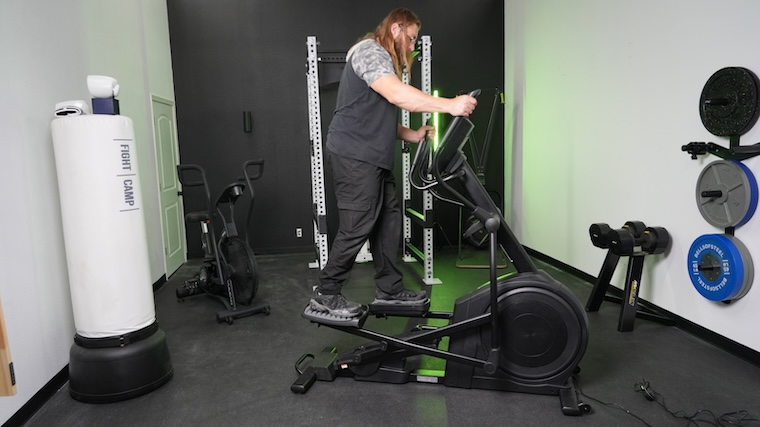
In addition to app integration, which provides access to thousands of on-demand classes and scenic jaunts, high-end ellipticals for home use may also include the ability to view content from your own Netflix, Hulu, and Disney+ subscriptions.
“Luxury options may have a weight capacity of 350 to 400 pounds,” says Capritto. As such, you can expect these pieces of exercise equipment to weigh more and take up more space than mid-range and budget buys. While these ellipticals tend to have transport wheels, they’ll nevertheless be tough to maneuver, especially if you’re dealing with a built-in touchscreen.
Some of our favorite brands for high-end elliptical machines include NordicTrack, Sole, Life Fitness, and Precor.
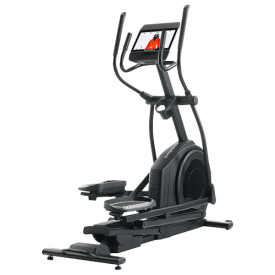
With 26 levels of resistance, incline and decline capabilities, and an adjustable stride length that toggles to your personal preferences, the AirGlide 14i is one of the most tech-savvy and feature-rich ellipticals on the market. Plus, like other NordicTrack machines, this elliptical is compatible with iFIT, unlocking over 17,000 live and on-demand workout programs for a fresh sense of training each time you hop on for a session.
The $1,799 NordicTrack AirGlide 14i made the top of our list of the best commercial ellipticals thanks to its 26 levels of Silent Magnetic Resistance, -5 to 15-percent incline range, 300-pound user weight capacity, and 14-inch HD touchscreen, which can stream iFIT programming. A subscription to this programming will cost you between $15 and $39 a month, but we’re huge fans of the trainer-led scenic trails you can navigate on this app.
What Influences the Cost of an Elliptical?
Much like the best exercise bikes, treadmills, and rowing machines, an elliptical’s cost is influenced by its size, onboard technology, and build quality. Below, we get into some of the main driving factors of cost for these exercise machines.
Features and Technology
The more features you find on an elliptical, the higher its cost tends to be. The primary features that drive cost are high-resolution touchscreens with integrated programming and Bluetooth and Wi-Fi connectivity. Compatibility with fitness trackers and heart rate monitors is also a plus.
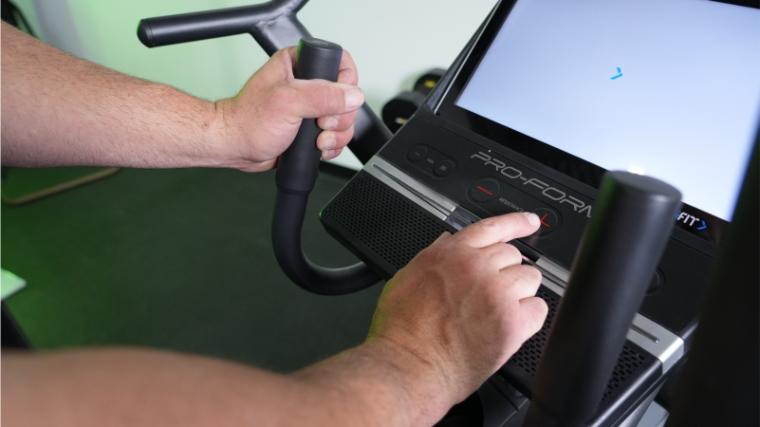
Other notable features include adjustable stride length to accommodate a wider range of users, incline capabilities, and elevated monitoring options from integrated handlebar pulse sensors.
Build and Weight Capacity
The choice of build material for an elliptical will influence both weight capacity and cost. Steel and aluminum are often used on frames, but higher-end options will typically feature a thicker gauge of steel and less overall plastic in the build. Tougher steel and minimal plastic tends to mean more durability and a longer lifespan for your cardio machine.
The weight capacity of a home elliptical is also a good indicator of how high-quality its build is. In general, an elliptical cross-trainer that can support users 300 pounds and above will feature tougher, longer-lasting materials than one with a max user weight of 220 pounds.
Similarly, more mid-range and high-end ellipticals feature heavier flywheels than budget options, providing a smoother pedal stroke and added stability. While the industry standard for a flywheel is between 16 and 20 pounds, you can find flywheels up to 30 pounds (or more) on high-end ellipticals. For example, the $2,799.99 Sole E95S features a 30-pound flywheel.
Delivery and Assembly
“Higher-end models are generally very heavy and can be unsafe for one person to move on their own. White glove delivery and assembly, which costs extra, might be required,” says our expert reviewer, Amanda Capritto. For example, many of the best ellipticals for heavy people weigh between 150 and 250 pounds, so you’ll want to consider paying for help with the transport and assembly of these machines.
It’s important to understand how much it’ll cost to have your elliptical delivered, and if you’ll need additional help to get it up and running out of the box. The cost of delivery can range from free up to around $200, and in-home assembly will often tack on an additional $50 to $150 charge.
From our experience building almost 30 ellipticals, we think most able-bodied individuals will be able to put together most budget-range ellipticals. However, it’s worth considering white-glove assistance if you’re purchasing a mid or high-end elliptical.
Resistance
Ellipticals feature air, magnetic, or electromagnetic resistance. Magnetic resistance tends to use manual adjustments, where the user spins a knob to increase or decrease the intensity of their workout. Magnetic resistance typically offers a smoother and quieter workout experience than air-powered machines, which can make quite the whoosh during use.
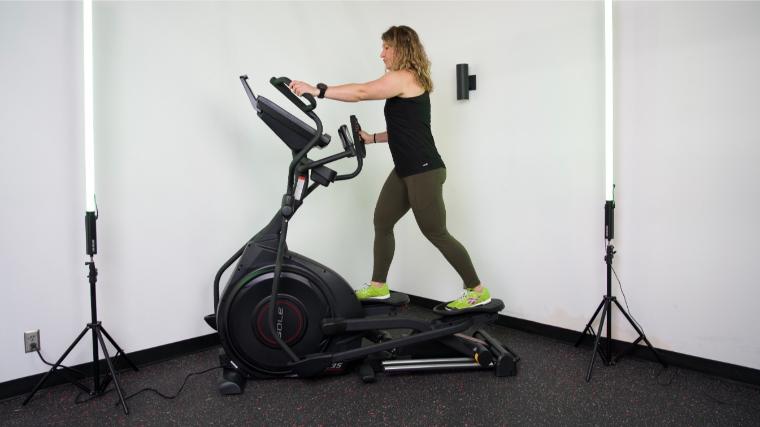
Air resistance on these machines is similar to what you’ll find on an air bike, where the intensity of your workout is dictated by how hard you work. The faster you pedal and push on the handles, the faster the fan spins, battling against the air to create resistance. This type of resistance tends to be less expensive than magnetic resistance.
Hidden Fees and Additional Cost Considerations
When perusing the cost of ellipticals, keep in mind that there may be more fees down the road. From delivery costs, monthly app memberships, and the necessary maintenance to keep your equipment in tip-top shape — see our list of the best lubricants for ellipticals — it’s important to understand what additional costs you may incur beyond the ticket price.
Maintenance and Repairs
Outside of your warranty period, keeping your elliptical up and running can add to your tab, but this investment helps to prolong the life of your equipment. Below are some ballpark costs for common elliptical maintenance.
| Type of Maintenance | Cost of Repair/Replacement |
| Lubrication (Maintenance) | Around $30 a year |
| Drive Belt | Around $50 to $100+, plus labor |
| Pedals and Stride Length Adjusters | Around $50 to $200+, plus labor |
| Electronics | Ranging from $100 to $500+, plus labor |
| Noises from Equipment | Around $50 to $200+ for labor |
| Resistance | Ranging from $150 to $400+ |
| Motor Replacement | Around $100 to $500+ |
Regularly clean, lubricate, and inspect your machine for wear and tear. Catching and fixing an issue early can help keep the cost of maintenance and repairs down, so you can tackle things before they become a real problem.
[Related: How to Clean Ellipticals]
Subscriptions
Depending on the brand of your elliptical, you may need to keep the subscription fee in mind when it comes to how much this equipment will cost you. If you’re choosing a mid or high-end elliptical with a generous touchscreen, a subscription may be necessary to take advantage of your machine’s full capabilities.
Below are some common subscription services you may see while shopping for elliptical machines.
| App | Compatibility | Cost |
| iFIT | ProForm and NordicTrack | $15 to $39/month |
| JRNY | BowFlex | $11.99 to $19.99/month |
| Echelon Fit (Premier) | Echelon | $34.99/month |
Final Word
The market for ellipticals has a huge cost spread, providing basic options for those looking to spend under $1,000, and some machines that cost over $3,000. Knowing the reasons why a machine costs more or less can help you navigate which options are best for your lifestyle and goals. “Even the simpler, budget-friendly models are machines with many components, so potential buyers should be aware of what’s considered standard, better, and best when it comes to elliptical specifications,” says Amanda Capritto, our expert reviewer. Just remember that, as is true with many things in life, you get what you pay for.
Sub-$1,000 budget ellipticals are the most basic machines and won’t provide you with a ton of tech features or a wide range of training capabilities. Mid-range models between $1,000 and $1,500 have more options to consider, like touchscreens, incline, and preset programming, but you’ll generally have to choose which features you want and which features you can live without. High-end ellipticals over $1,500 tend to have many of the best features, but these machines can be very heavy and take up a lot of space.
FAQs: How Much Do Ellipticals Cost
How much do ellipticals cost?
You can find options as low as $100 and as high as $3,000 or more. Lower-priced budget ellipticals under $1,000 often sacrifice features to keep the cost down, but these machines are great for those looking to test the waters of elliptical training. High-end machines over $1,500 tend to have a wide range of resistance levels and incline capabilities, plus built-in technology to support your training.
Is an elliptical better than walking?
All exercise is good exercise. However, training on an elliptical machine is a total-body workout as compared to walking. When you increase resistance, pushing and pulling on the handlebars while you stride can work as a form of strength training and cardio. While walking and using an elliptical are both considered low impact, you can work up more of a sweat on an elliptical compared to on a walk.
Are ellipticals worth it?
It all depends on what you’re looking to do and your personal preferences. Training on an elliptical can help build muscle, burn calories, and strengthen your heart and lungs. You’ll also be protecting your knees and joints since your feet never leave the pedals.
References
- Bosch, A. N., Flanagan, K. C., Eken, M. M., Withers, A., Burger, J., & Lamberts, R. P. (2021). Physiological and Metabolic Responses to Exercise on Treadmill, Elliptical Trainer, and Stepper: Practical Implications for Training. International journal of sport nutrition and exercise metabolism, 31(2), 135–142. https://doi.org/10.1123/ijsnem.2020-0155
- Choi, M., Yoo, J., Shin, S., & Lee, W. (2015). The effects of stepper exercise with visual feedback on strength, walking, and stair climbing in individuals following stroke. Journal of physical therapy science, 27(6), 1861–1864. https://doi.org/10.1589/jpts.27.1861
- Jewell, T. (2023, August 15). Everything to know about VO2 Max. Healthline. https://www.healthline.com/health/vo2-max
- Rae, H. (2024). Mattress Size Chart & Bed Dimensions. U.S. News. https://www.usnews.com/360-reviews/sleep/mattress/mattress-sizes